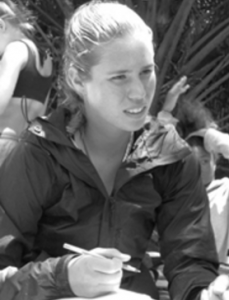
Anne Hersman began working with Outward Bound in 2013 as an intern for students who are “at-risk.” Previously she had been substitute teaching after receiving her teaching certificate. It was during this time that she realized her students had issues in their lives that were more pressing than math. Her desire to help young people define and achieve success in their lives drew her to working with Outward Bound.
1. Why do you enjoy working with this student population?
I enjoy working with this group because the students are very real, they have vibrant personalities, and are willing to try new things. The best part about these particular programs is that we don’t only focus on leadership and changing lives though challenge and adventure, we also get to talk to these students about real life problems they are facing, create plans for change on course and at home, and then follow up with those plans.
2. What kind of qualifications do you need to work with struggling youth?
I’d say the most important qualification is a passion for working with students who have struggles in their lives. After that, our instructors need to have completed an At-Risk Internship, multiple trainings, and consistent mentorships. Communication, anger management, problem-solving, goal-setting, and eliciting change are common topics instructors discuss.
3. What do you think the biggest challenge is for these students outside of Outward Bound?
The biggest challenge for students outside of Outward Bound is when students go home to the same or similar environment as before. The students have to be brave and step up against the pressures of friends, family, and society by making very conscious decisions in order to cause change in their lives.
5. What is your fondest memory of working with a student?
One of my fondest memories of working with a student happened on a Key Largo Boys FINS course. At the beginning of course, there was a student who was struggling with wanting to be at Outward Bound, making positive decisions, and following expectations. These behaviors continued to occur until solo, where students have time to reflect on the course and the changes they want to make. During solo, this student decided that he wanted to change his attitude and behavior on course and at home and when the students came off of solo, he spoke to the group about how they all needed to step up and become leaders because it was going to be really hard when they got home. After this speech, his group became focused on being positive leaders and finishing the final push out of the Everglades to home. A few days later, the group unanimously voted him into the permanent student leader position. On the last day of the expedition, he was talking about his experience and he said, “I have never tried harder for something I didn’t want to do.” During follow up, he was very successful and taught his younger brothers and sisters the tools and lessons used on course. This memory reminds me that everyone has amazing potential, but sometimes needs a little spark to get going.


